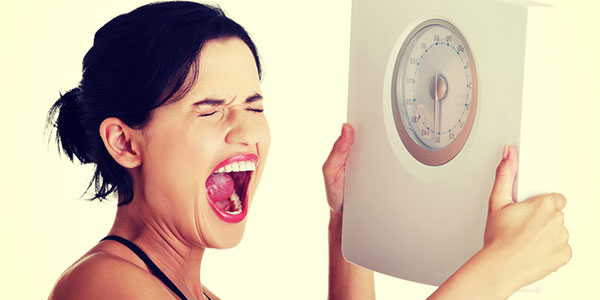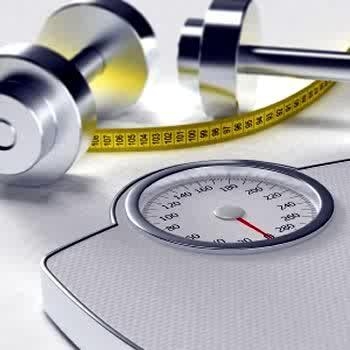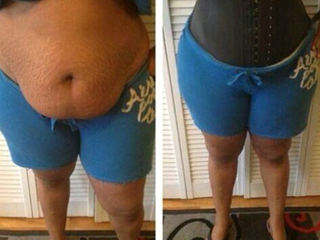The 8 Reasons You Gained Weight This Week
The 8 Reasons You Gained Weight This Week
All the effort you put in this week from meal prepping, to exercising, to getting enough sleep… Only to find out you have GAINED weight. Don't let those pesky added pounds daunt you - it may be one of these 8 reasons why you recently gained weight.

All that effort put in this week from meal prepping, to exercising, to reaching adequate sleep… Only to find out you have GAINED weight. It is important to remember body weight can fluctuate and can do so very naturally. Do not let those pesky added pounds be discouraging on the scale. Instead, acknowledge what could have caused that unexpected weight gain and move on that much stronger for the following weeks to come!
8 Reasons Why You Recently Gained Weight
1. Inconsistent Weigh Times
Various weighing times can dramatically affect the number on the scale. It is actually more surprising than not if your weight remains consistent across the day's span. Right when you wake up (and use the bathroom) is likely to be the lowest weight you will see all day. Stick to designated weighing times – either weigh yourself in the morning, night, or whenever in between, not going back in forth between various times.
2. Scale Additions
Like weighing times, try to stay consistent with clothing attire when stepping on the scale. Heavy boots or coats can easily add on additional pounds. Don't let variable clothing pieces and additions become startling when stepping onto the scale.
3. Hydration Changes
This concept is more or less known as the pretentious "water weight." When individuals say they lost 10 pounds in just one week, it is more than likely related to water weight, not fat loss. The intake and loss of fluid has the tremendous capability to fluctuate the scale, especially considering more than half the body is comprised of water. Most importantly, do not shy away from water intake to see a lesser number on the scale. The average, healthy adult needs eight cups each day!
4. Bathroom Habits
Bowel routines can also be a culprit of unexpected weight gain. If you find yourself irregular, you may be experiencing uncomfortable bloat, constipation, and/or diarrhea. If dealing with any of these conditions, try adding more fiber into your diet. Be sure to increase water intake with increased fiber to reduce the further risk of constipation.
5. That Time of the Month
Sorry females, menstrual cycles can certainly have an impact on weight. Not only is bloat uncomfortable, but dealing with it can make clothes seem a little tighter and the scale a little higher. Additionally, do not reach for those comfort foods during this monthly, hormonal time. Take a warm bath or practice any other stress-reduction technique to defeat those powerful moods and weight gain potential.
6. Mood Changes
Stressors in life may trigger mood changes. Feelings of stress and depression may encourage the phenomenon known as "stress eating." Unfortunately during these times, cravings are are not for a bag of carrots, but often prepackaged foods rich in fat and sugar. To reduce these bouts of binge eating like expressed in "that time of the month" mentioned above, practice other stress-reducing techniques.
7. Eating Too Many "Diet" Foods
Although they may sound appealing, it is important to stay weary of all those "diet" foods and gimmicks. Labeled items like "sugar-free" or "fat-free" does not automate it into a healthier product. For instance, a "fat-free" product often contains high amounts of sugar and unrecognizable ingredients. "Sugar-free" desserts also do not mean "calorie-free." Overeating sugar-free foods can still contribute to weight gain and curate gastrointestinal distress related to sugar alcohols and substitutes.
8. Sodium Overload
Sodium and salt gets a bad reputation when discussing blood pressure. However, the body needs this valuable electrolyte to carry out life-sustaining processes. Unfortunately, though, the general population consumes too much sodium in the diet. Salt has the ability to retain water in the body, thus increasing water weight. The American Heart Association recommends healthy individuals should consume 2,400 milligrams or less of sodium each day, or one teaspoon. Avoid added salt by ditching the salt shaker and purchasing fresh foods over prepackaged products.
The number on the scale can be slightly discouraging. Instead of always fixating on the numbers, try to guide weight loss on how your clothes fit. Health is a continuous lifestyle change and if you feel the best you've ever felt, do not let those numbers defeat you!
-
4 Reasons Your Stressed-Out State Is Stopping You From Losing Weight
-
Why You Must Eat Before Going To Bed
You have probably heard the old myth, that you should not eat before b
-
Omega 3 Weight Loss Link Revealed
New findings show that the omega 3 fatty acids EPA and DHA may play
-
Diet Solution Program - How To Help Your Obese Child
It can be difficult in the world we live
-
Teen Weight Loss
Obesity among teenagers in the United St
-
While You Might Consider Weight Loss Pills
Of course, people dont plan to be overweight. Its is something that ju
- DON'T MISS
- How to Exercise Away Your Unwantd Flab
- Pros and Cons of Online Relationships
- Easy Weight Loss - How To Lose Weight With Diets
- Control Your Desire for Food for Weight Loss
- Use These Fat Burning Foods Today For Successful QWeight Loss
- Keeping Weight Loss In Mind
- Fat Burners - Do They Help You Lose Weight?
- What You Must Know Before You Try Zone Diet!
- Geary’s Truth About Abs: Diet Plus Effort Pay Off
- 12 Helpful Tips From Women Who Have Successfully Lost Weight




